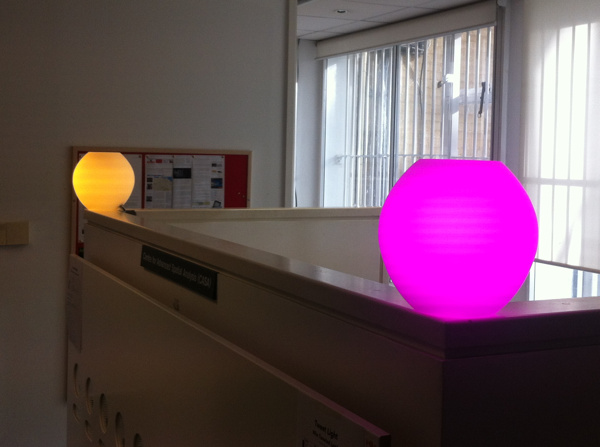
Talking Rabbits and Glowing Lamps – The Internet of London Things
At CASA we’ve always been keen on marrying the online with the tangible – such as the London Data Table (a real table, cut in the shape of London, showing live London data), PigeonSim (fly around a Google Earth view augmented with real-time information) and a couple of 3D printers, one of which was used to print the results of an online mapping field project in Lima, Peru, a couple of weeks ago. One of CASA’s core research projects, Tales of Things, is all about this space.
 Over the last couple of days, Steve, boss Andy and I have been working further on linking online and offline London, by making use of Boris, one of the two Karotz Rabbits that have been knocking around the lab for a while (the other one is of course called Ken), plus a couple of wifi-controllable multi-colour Hue lightbulbs that we acquired more recently.
Over the last couple of days, Steve, boss Andy and I have been working further on linking online and offline London, by making use of Boris, one of the two Karotz Rabbits that have been knocking around the lab for a while (the other one is of course called Ken), plus a couple of wifi-controllable multi-colour Hue lightbulbs that we acquired more recently.
Steve has set up a couple of servers that receive instructions as simple URL requests, format them and pass them to the external company servers that are an inevitable part of most sensor products these days. (In the case of the Karotz server, this usefully turns text into audio files.) The servers then send instructions back into our network and on to the objects themselves.
A few Python scripts later, and we have the following:
- Boris announces changes to the statuses of the various London Underground lines, when they occur. He also flashes the colour of the affected line as he speaks the message. Between announcements, Boris will pulsate the colour of lines which are not in “Good Service”. His ears also twitch appropriately – appearing fully alert when there are major problems on the network, and a more lackadaisical look when everything’s OK.
- The first hue lamp, which sits in a spherical orb, shows the weather forecast, as calculated by CASA’s own weather station that sits on the roof of the building opposite. Steve has configured it to show a yellow glow for sunny and dry weather to follow, while a moody blue indicates rain. Disruptive weather, such as likely snowfalls or strong winds, are shown in red, while rain ceasing is green.
- The second lamp, also in a spherical orb, polls a special Twitter list of active CASA researchers. Every time one tweets, the lamp which change to a particular colour linked to them. For instance, when I tweet about this blogpost, the lamp will turn a distinctive shade of green.
Data Sources
The rabbit, which is in the video above, sits in front of a TV showing CityDashboard, and speaks its wisdom to the office in general from time to time. The video shows him announcing that problems earlier on the Central and District lines are resolved. After the announcement, he goes back to pulsating green to indicate an ongoing District Line issue. The data comes from the tube line status panel on CityDashboard which is itself using the near-live feed from Transport for London’s Developer Area.
The lamps are in the corridor connecting CASA to the rest of the building. As such, it’s often quite a dark place, but now is bathed in an everchanging glow of light based on both sensor data (weather) and social media output (tweets) from our digital city. The Twitter data for the second lamp comes from the London Periodic Table, which accesses the data from Twitter via a proxy server that Steve built. Once a change is detected, another of Steve’s servers is used to send the message to the Hue servers, which then send it back through a special link, to the lamp. Convoluted, but, with a 10-20 second delay, it does work!
Steve has written up a blog post with more details behind the servers that make the system work.
Panos Mavros, a Ph.D student here at CASA, is also using the Hue lamps, in his research into “digital empathy”. He is bringing a whole new meaning to the phrase “mood lighting” – he only has to think and the colours change!

